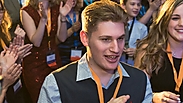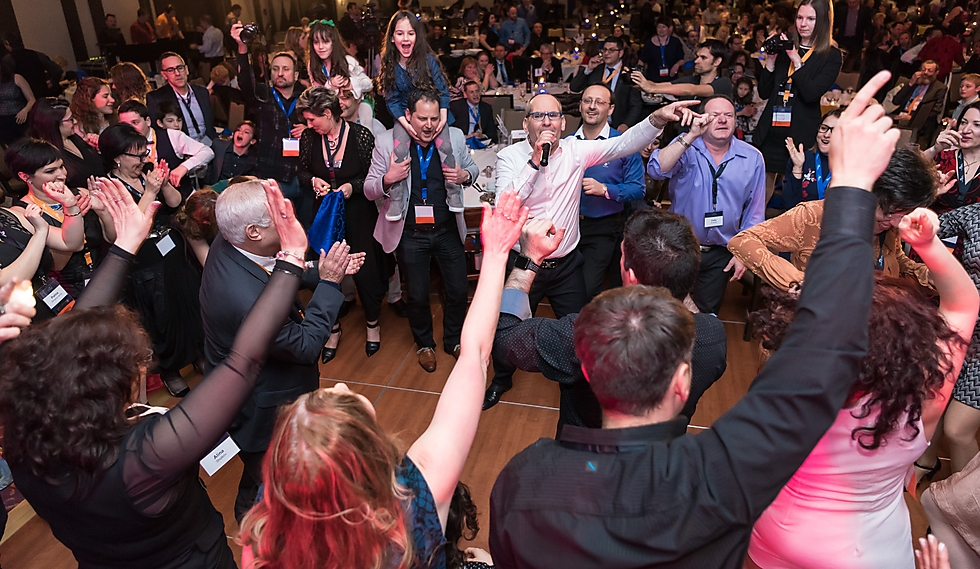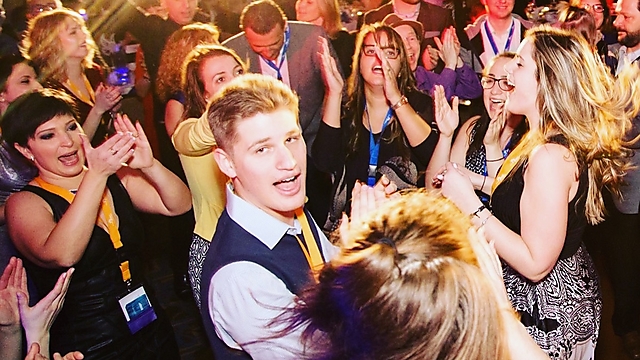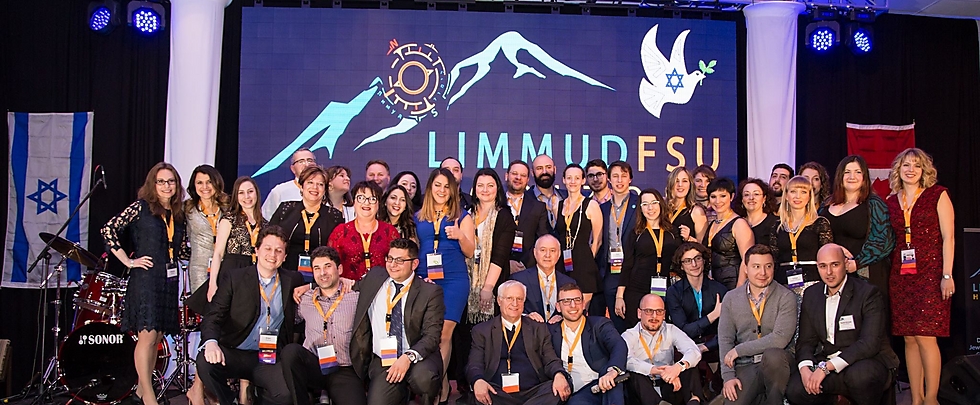
Migrants from former USSR connecting to Judaism overseas
They emigrated from the Soviet Union to Israel but were frightened by the economic and financial difficulties; some 70,000 Russian-speaking Jews now live in Canada, where they are connecting to Judaism, which had been previously left behind.
According to Interior Ministry data, about 30% of those who immigrated in the 1990s are not halachically Jewish. Non-Jewish immigrants came under the "grandchild clause" in the Law of Return, and expected to nevertheless be treated with the required respect, and not be discriminated against by the state—expectations that quickly dissolved and added to additional difficulties.
All this and more encouraged large numbers of immigrants from the former Soviet Union to pack their belongings and emigrate for the second time in their lives, this time to Canada, and for good reason: Canadian Jewry is the fourth largest in the world after Israel, the United States and France. The figures speak of 388,000 Jews living in the country, and constitute about 1.1% of Canada's population as a whole. Most of the Jews who immigrated to Canada settled in the cities of Montreal and Toronto, with Toronto leading with no fewer than 200,000 Jews.
The figures speak of some 70,000 Russian-speaking Jews living in Canada today, most of whom immigrated to Canada from Israel. But what is really interesting is that in Canada, a country based on immigration and immigrants and multiculturalism, immigrants from the former Soviet Union found a renewed connection to their Judaism—a deep connection they had never experienced, especially in Israel.
The discovery and reconnection is now being led by the Y generation of immigrants from the former Soviet Union, young people in their 20s who were born in Israel and emigrated with their families to Canada when they were in their early teens, some of them even before.
I met some of them at a special conference of Limmud FSU, which took place in a town north of Toronto. The two-day conference, which attracted 700 Soviet Jews living in Toronto and its environs, is part of the organization's ongoing activity to unite Soviet Jews through voluntary conferences and festivals.
The Limmud conferences, founded by Chaim Chesler, aspire to restore the communal spirit, as well as to encourage recognition of Jewish identity. So how did it happen that the young people—more than 50,000 in the last decade—flock to these conferences in droves and even "infected their parents" with this metaphorical bug?
Sergei Patrenko said, “My son brought me to this festival.” He and his wife Alla were born in Ukraine. They married at the age of 17 and immigrated to Israel as part of the mass wave of 1990-91. Their two children, Dan, now 18, and Michal, 16, were born in Israel. When Dan finished second grade, the family left for Canada. The parents ran an employment agency in Israel, and opened a branch of it in Canada, from which emerged the idea of emigrating.
Unlike other families who left Israel, Sergei and Alla maintain a close working relationship with Israel. Three years ago, their son Dan asked them to go with him to a Limmud festival, and after much cajoling, they reluctantly agreed. Sergei said, “It is very easy to lose your Jewish identity in your daily life when you don't live in Israel, especially in a city like Toronto. This is an international city, and in the course of our work we meet people from dozens of different countries.
"My wife and I lived in Israel for 16 years, and this formed our Jewish identity. Even though our children were born in Israel, they have lived for most of their lives in Canada, and feel a strong connection to their Jewish identity, and that is thanks to conferences like these, where there is no pressure, and the programming is not one-sided. The festival can open with lectures on religion, and close with a workshop on making gefilte fish. The children meet and enjoy being with other Jewish children, and are exposed to a wide variety of interesting and varied topics on Jewish and Israeli subjects.”
Holocaust, Aliya and Migration
Dan’s connections to his Jewish roots find expression not only in persuading his family to attend communal activities. At his young age, he has already written a play that has been staged in small theaters in Canada, and which relates what happened to his mother’s family in Ukraine in the shadow of the Holocaust and anti-Semitism. “The play is called Train for Two, and it is a drama in one act that deals with the story of a man who betrayed Jews during the Second World War in order to get money to save his sick wife,” explained Dan.
“The man cannot forgive himself for what he did, and lives with deep regret for the rest of his life.” Alla explained, “The story is of a Ukrainian couple who looked after my younger brother and me when we were children. We called them Granny and Granddad from the very first day, and we were sure they were our real grandparents. They were neighbors, and at some point, after Granddad died, we found out that during the war, he had betrayed Jews. We also found out that for his entire life, he suffered deeply, and lived in agony because he had betrayed a Jewish family.”
Alla Petrenko was 14 years old when she learned the truth. “Granny was deeply religious, and throughout her whole life she tried to persuade our family to immigrate to Israel. And even though she was not Jewish, she believed that Jews should live only in Israel and that only there could they feel protected. The story came to light after Granddad died, and one day before we were due to emigrate to Israel, Granny died, as if she had closed the circle of her life’s ambition. Every eve of Yom Kippur, I light a candle in her memory.”
,
Distance Makes Connections
“Until a few years ago, I had no particular connection with Judaism,” admitted Boris Varshavsky aged 26, one of the festival’s leading volunteers, who emigrated to Toronto with his parents when he was only nine. “I grew up in a Russian home that was kosher in its own way, but I didn't pay much attention to it. At university I met a counselor who was active in the Jewish students' organization. Through him, I joined a group of people who were concerned about Israel and their Jewish roots. That led me to reconnect with my own Jewish roots and through them, I became in touch with the non-Russian Canadian Jewish community.”
Leon Martinenko, 33, rediscovered his Jewish roots only after arriving in Canada. “We immigrated to Israel from Russia in 1996 when I was only 13 years old. For most of my life my Jewish identity was completely secular. I didn't keep Shabbat and I didn't observe kashrut. I served in the IDF and I love and support Israel, but at some point I recognized that my philosophical identity and outlook on life depend on what I do here. Who am I? What is my role in life? Slowly I began to appreciate the beauty of Judaism. That happened when I was 25, the age at which one begins to ask questions.”
“In the first five years of my life here, I was not involved with the Jewish community. I worked in security jobs because in Israel I had served in a combat unit and I was full of self confidence. The community here is very supportive because we are all immigrants, but at a certain point, you begin to lose your Israeli identity, until you suddenly realize again that even here you are different. This feeling began as a result of a relationship I had with a Canadian girl. Through the connection with her I began to be exposed to and take an interest in Judaism and hassidut, and I suddenly realized that maybe there was something I had missed. I cannot say that I have become newly religious or that I am haredi, but I do feel somehow strengthened. This change of direction led me to leave my group and brought me closer to the Jewish community. Previously, my friends here were all Canadian.
“In 2013, while still a student, I had the opportunity to go to the Limmud FSU conference in New York, and I got bitten by the bug. I encountered old-style Russian and Soviet culture, and realized how much I missed them. I began to understand that there is a link between Judaism and searching for answers to questions like what am I doing here. And what’s more, it was not rigid and allowed me to practice Judaism in a way that makes me feel comfortable.”













